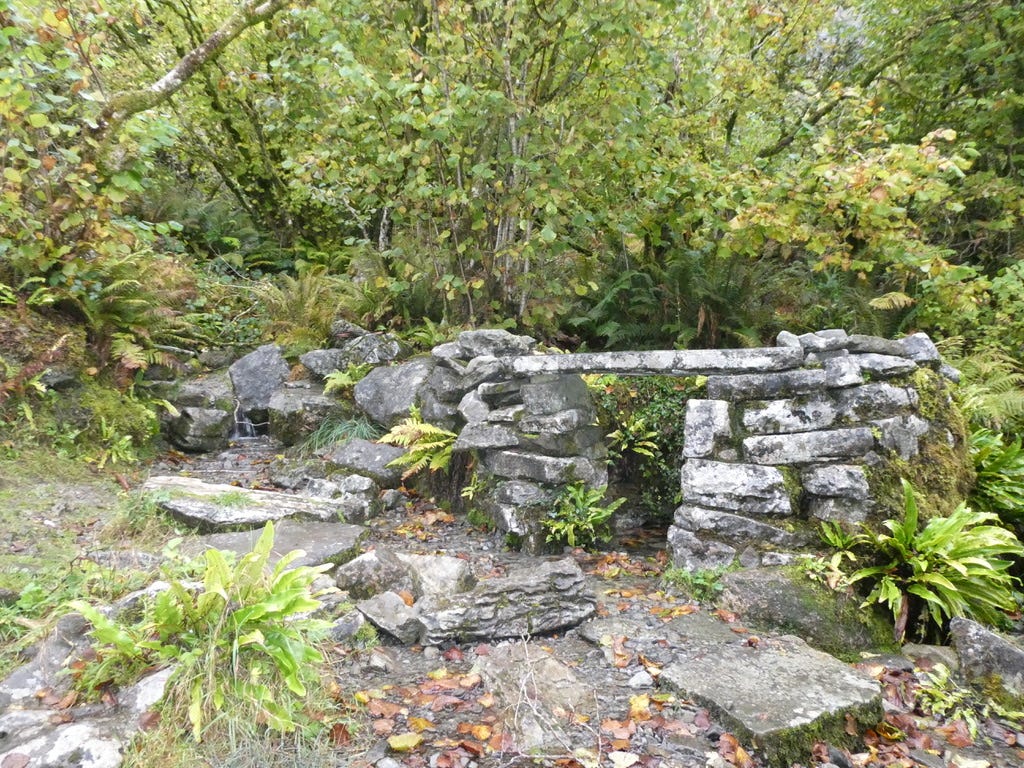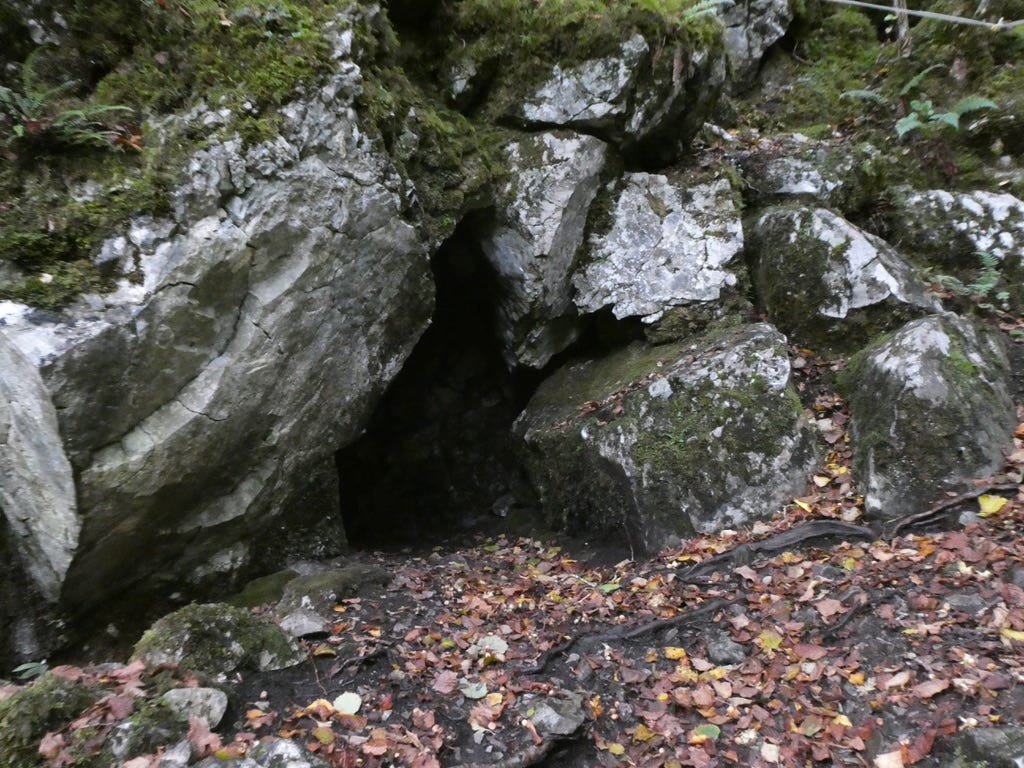Tobar Mac Duagh, Kinallia, County Clare
I have written about St Colmán Mac Duagh before - not once but twice - and I will probably do so again. He is the Irish saint I perhaps feel most attached to, and this is mainly because I love the site of his hermitage, which I have visited many times. This wooded site in the limestone hills of the Burren consists of a spring which emerges from the mountain, a holy well, the cave in which Colmán lived for seven years, and the remains of a church.
This well is usually named Tobar Mac Duagh, or some variant thereof. What I like about Irish place names is that the Anglicised spelling is never consistent. It is as if the places themselves keep slipping the yoke of their human names, especially the English ones. ‘Tobar’ or ‘Tober’ is a word we’ll come across a lot, though: it simply means ‘well.’
Most holy wells in Ireland are surrounded by a manmade well house, and they vary enormously in quality, complexity, grandeur and date of construction. I usually prefer the simple ones. This one is almost megalithic in its design, which is in keeping with the ancient landscape it is rooted in. Not very far away, for example, you will find this five thousand year old portal tomb:
The circular wall of the well house here is drystone, made of limestone collected from the surrounding plains. Niches on the inside of the wall were included, so that offerings could be left. We’ll be talking a lot more about well offerings during this series.
There was until fairly recently a large tree next to the well, on to which further offerings were tied - the ‘rag tree’ next to the well is a common and important feature of the holy wells in Ireland - but for some reason it was felled a few years back1. Felling beautiful old trees is a local pastime around here, but I’m going to avoid complaining about that now and write instead about the water.
The well house contains a still pool in which frogs lay their eggs in the spring. I don’t advise drinking from it. If you’re thirsty, follow the sound of the water. The well is fed by a small stream which gushes perpetually from the rocks beneath Eagle Crag, just a few metres away.
Here is the entrance to the underworld:
The water that emerges is cold, clean and delicious. It’s easy to imagine St Colmán, more than a thousand years ago, subsisting on this, along with hazelnuts and mushrooms from the woods, before retiring for the night to the cave in which he slept:
Inside, the cave looks like this. There is just enough room for a six foot human to lay himself down. To sleep there, you have to be fine with spiders and rain:
Mind you, some of the oldest stories about St Colmán suggest that his life here was not always a solitary one. In some stories, we read that he had a servant - though not for long, as one tale recounts. All the old stories of Ireland’s saints, like those elsewhere, have the holy men performing miracles, and St Colmán is no exception. One of his notable miracles seems to be a warning against gluttony:
One day his servant complained that he was hungry and St Mac Duagh replied that God would provide. There was a banquet at the time at King Guaire’s castle in Kinvarra and at that moment the dishes of food suddenly rose and floated out the window. The surprised king and his men followed the dishes and were led to St Mac Duagh and his servant. But when the king’s party arrived at the hermitage their feet became rooted to the stone and they couldn’t move. Luckily for the king and his men, St Mac Duagh was able to perform a miracle and free them, whereupon the king was so impressed with St Mac Duagh he asked him to found the monastery of Kilmacduagh on the lowlands near Gort. While this was taking place St Mac Duagh’s servant was eating King Guaire’s food with gusto but unfortunately had grown so accustomed to the meagre diet he received in the service of St Mac Duagh that the banquet food killed him.2
St Colmán is said to have built an oratory church on the site. It was probably made of wood, and nothing remains. But the ruins of a medieval stone church on the same site remain, moody in the mists of the mountain:
Climb over the rubble and peek around the back of the church and you find this rusty metal cross. Apparently it appeared here one day in the 1980s and has been at the site ever since:
I love this spot, and could come here every day. Not everybody feels the same. In 1839, the man from the Ordnance Survey, who visited as part of the British government’s project to map all of Ireland, was not impressed by what he found:
What a dismal and gloomy spot! I walked thither on the 15th October from Corofin and I never felt so fatigued after having walked for miles across that country on the uneven surface of the limestone rocks. What an enthusiastic recluse St Colman, the son of Duach must have been to have retired from the busy scenes of life to contemplate eternity and uncertainty of human fate in the dismal valley then thickly wooded and haunted by wolves!3
Perhaps I would feel differently if the wolves were still around. To my mind today though, this place has the strange feeling of being a kind of second home. A retreat centre for when the world gets too much, and when God calls from the hills. Something about it speaks to me. It is one of the wildest wells I have come across on my wanderings, in one of the most beautiful places. This is Ireland’s green desert.
You can follow my ‘Fifty Holy Wells’ series as it develops by clicking on the Holy Wells link on the homepage menu.
If you’d like to read an official analysis of the kind of things that are left at the well, along with some agonised debate about whether they count as ‘real’ religious offerings or just litter, you can read this report.
Quoted at https://pilgrimagemedievalireland.com/2017/08/07/st-mac-duaghs-hermitage-co-clare/
See note 2














Lovely piece. It brought back to mind the "spring house" on my grandparents' farm. It was a small fieldstone shed built over a spring just downhill from the house. Inside, the floor was a smooth rectangle of water, kept to a consistent level by what amounted to a small dam at the rear of the structure, over which water constantly trickled, flowing out the rear of the house so that the area behind it was always a bit squishy. On older American farms, spring houses were common features, as I expect they were in many places. While they were built partly to protect water sources, their main purpose, especially by the time my dad came along, was refrigeration. No matter how hot it got in the summer, the spring water was cool enough to preserve food, which was kept in large jars or pots sunk into the water. And no matter how cold it got in winter, that liquid rectangle would never freeze.
No one ascribed sacredness to the place (and my grandparents, being good Methodists, would have scoffed at such superstition), but it was a place that had a strong presence. On the rare occasions I saw inside (by the time I came along not much was stored there except soft drinks for the big family gatherings we had at the farm), I did feel something akin to reverence. The inside was dark, still, and silent, and but for the watery floor, the place could have passed for a disused chapel.
I didn’t think the spring house pointed toward God, but it did seem to point to a life lived close to the land, lived with a reliance on the land being itself. Taking water the land gave without being prodded by an electric pump. Cooling food without plugging in a refrigerator. That was something already appealing to me in my pre-teens. I didn’t then have the notion of deliberately inhabiting places such as I would pick up later from nature writers, but I felt like I glimpsed something like that resting in the cool shadows of the spring house. And if that spring house intimated life in harmony with some sustaining wholeness, perhaps there was sacredness about it.
Interesting.
We have a similar history here in Norway, with "holy places" and "hermit's places" (indeed, many missionaries also came to Norway and Iceland to seek God, probably from Britain and Ireland - some historical sources say that hermits were on Iceland when the Norwegian Vikings arrived there to settle).
In my area the small huts of the hermits were called "Kova". So that word is probably related to "cave". The word is not in use in Norwegian anymore, but some people in my area have the name "Kovajord", "cave-earth" or "cave-field", and I suspect that this name relates back to this phenomenon.
There was also much transferring of more ancient "nature mysticism" over to Christian folk beliefs, in medieval times. This also would include the intermingling of Christian faith with elements of nature (trees, plants, flowers, rocks, sites etc.) But in Norway this eroded away after the Reformation, so to speak, but especially as late as the 19th century (that is when "The Enlightenment" and modernization kicks in, for better and for worse).
I have thought about an idea of starting a scout group in my local church which would deal with practical tasks and experiences (classic scouting things), but connected to nature elements: Fire, water, earth, air, types of animals etc. The thing is: Each of these elements is "spiritualized" and "divinized" in the Bible, in complex ways. (God is in the fire (Moses), in the wind (Elijah, in a "Kova"), in holy water (baptism or ritual cleaning of the law), in wood (tabernacle) etc. etc.) So it is would seem quite fruitful to build bridges between the Tradition/liturgy/spirituality and practical experience of - and engagement with - nature. Of course there is much mysticism involved in these things, but at the same time "the metaphysics of mechanical materialism" is no longer really believable, if it ever was.